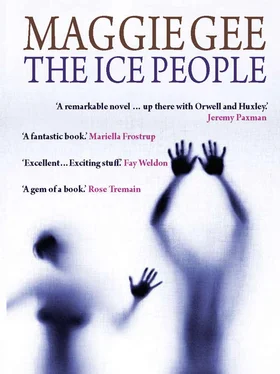Maggie Gee - The Ice People
Здесь есть возможность читать онлайн «Maggie Gee - The Ice People» весь текст электронной книги совершенно бесплатно (целиком полную версию без сокращений). В некоторых случаях можно слушать аудио, скачать через торрент в формате fb2 и присутствует краткое содержание. Год выпуска: 2008, Издательство: Telegram Books, Жанр: Фантастика и фэнтези, на английском языке. Описание произведения, (предисловие) а так же отзывы посетителей доступны на портале библиотеки ЛибКат.
- Название:The Ice People
- Автор:
- Издательство:Telegram Books
- Жанр:
- Год:2008
- ISBN:нет данных
- Рейтинг книги:4 / 5. Голосов: 1
-
Избранное:Добавить в избранное
- Отзывы:
-
Ваша оценка:
- 80
- 1
- 2
- 3
- 4
- 5
The Ice People: краткое содержание, описание и аннотация
Предлагаем к чтению аннотацию, описание, краткое содержание или предисловие (зависит от того, что написал сам автор книги «The Ice People»). Если вы не нашли необходимую информацию о книге — напишите в комментариях, мы постараемся отыскать её.
imagines an ice age enveloping the Northern Hemisphere. It is Africa’s relative warmth that offers a last hope to northerly survivors. As relationships between men and women break down, the novel charts one man’s struggle to save his alienated son and bring him to the south and to salvation.
Maggie Gee
The White Family
The Flood
The Ice People — читать онлайн бесплатно полную книгу (весь текст) целиком
Ниже представлен текст книги, разбитый по страницам. Система сохранения места последней прочитанной страницы, позволяет с удобством читать онлайн бесплатно книгу «The Ice People», без необходимости каждый раз заново искать на чём Вы остановились. Поставьте закладку, и сможете в любой момент перейти на страницу, на которой закончили чтение.
Интервал:
Закладка:
Quite soon I glimpsed the title of what looked like a fairly routine scientific paper, dated that day, ‘Development Phases of Climatic Change’, and thought ‘Why not?’ So I started to read it. Two pages in, my heart began to race.
It was a study of the rate at which ice ages came, based on fossil evidence of bands of vegetation, the speeds at which deciduous trees liking warmth were replaced by coldloving conifers, for instance. I had always assumed — hadn’t everyone? — that ice ages took hundreds of years to get established.
But the new paper had resurrected an eccentric study from the last century which said it took only two decades to move from temperate to permafrost. They had rerun all the data, meaning to disprove it, and found the original conclusions held. So they took new measurements of fossilised pollen all over Europe. The findings were clear. Twenty years, that was all it took. Twenty years to slide into an ice age. Two decades. The blink of an eyelid.
I had a sudden feeling that I knew what was happening, I knew what was coming, had foreseen it all, had lived it already as my own heart chilled, as our happiness darkened and began to freeze over.
It got into the news a few days later. ‘New Ice Age?’, headline after headline enquired. For a few days the screens talked of nothing else.
The sensation would certainly have lasted longer if something hadn’t driven it off the news.
One evening I was sitting in front of the screen, feeling relatively happy, since it was Friday. I had done my work and had a pint of beer, eating chicken and halflistening to the news. It was a chicken breast, oval and pink, and I was just thinking that it looked like a face when a voice that had been weaving through my head and somehow becoming confused with the chicken breast suddenly said, quite clearly, ‘Tonight the manufacturers categorically denied that a Dove could feed off a living face. A spokesman for the company pointed out that Doves had long been especially valued for their excellent safety record with children. Meanwhile the baby is in intensive care and we await developments. Tonight women picketed …’ Et cetera, et cetera.
Dora was watching the news with me, her large blue eyes flicking from side to side in a parody of animation. Just when it got to the climax of the story — we saw the child who had been attacked, a sturdy blonde baby with crewcut hair, then an ‘after’ picture, a disc of bloody mess, a featureless horror in a tangle of tubes — Dora chuckled, with her ‘random’ chuckle, and turned to me, as she often did, and said ‘That’s funny. I feel happy’. I threw the rest of my chicken away and didn’t talk to Dora for the rest of the evening.
I somehow knew at once it was true. I remembered the flayed ground, the vanished cat.
The suspected Dove was a replicant. A thirdgeneration replicant. The screen showed us a picture; it looked innocent, as usual, they’d designed the things to look innocent. Next the manufacturer was brought on, sweating lavishly in a crumpled suit. The presenter asked him questions relating to the model of Dove that had just been shown. Then the manufacturer confessed this wasn’t actually the Dove that had halfeaten the baby.
‘Why not?’ the screentalker enquired.
‘Because it, ah, cannot be found.’
‘Do you mean it has escaped?’ The screentalker squeaked. She was a hysterical woman in a wig.
‘Doves can hardly escape, Miss,’ said the manufacturer. ‘Gone missing, perhaps. We shall soon find it.’
Dora did her random chuckle again. This time at least she didn’t speak, but I took her away into the spare room and left her for the night in outer darkness.
The next few weeks were very fraught. The screens didn’t know what to put first, a sudden flood of stories, only some of them authentic, about Doves eating sleeping cats, or a line of sombre, selfimportant scientists wanting to tell us about the new Ice Age. The Speakers came on and tried to calm us, those hideous dykes with their insincere voices, trying to show they weren’t panicking, trying to sound in control, and calm.
The men all rallied behind their Doves. Even I did, at first. It was clearly a fluke. The Dove in question had a programming error. We were the machinemen, the Scientists, the Greeks, and the women were trying to take away our machines, our sturdy blue babies with their lowpitched voices and sensitive feathers, the Doves who loved us. I went to the club and raged with my friends and we played with our robots and pined for our kids, and half of us secretly blamed the mothers for not protecting the children they’d stolen.
The fuss died down. It was September now. I settled back into my intimacy with Dora. The screens forgot the savaged baby, forgot the Ice Age, forgot all the horrors to concentrate on the big Tunnelrun that took place every autumn.
I loved the tunnelruns. Everybody bet on them. I bet five thousand on the Russian team. On the big day, I went to the Gay Scientists to watch the race and drink beer with my friends.
Halfway through the race we were shrieking with laughter at an unfortunate Frenchman who waggled his bottom, when they interrupted the programme with a news flash. A Dove in Scotland had torn off the leg of a newborn baby in front of its mother. They switched off just in time to save the baby’s life. Wicca World had at once demanded that production of Doves be halted, and all existing models destroyed.
‘Was it a thirdgeneration replicant again?’ I asked, but everyone was staring at the screen. It was only later that my guess was confirmed. I began to realise that the Doves were mutating.
Back at home, a refrain began in my mind; human error, human error. Mistakes had been made. We must do something. Human error, human error.
I was fond of Dora, I said sorry to her, I stroked her soft panels and apologised, but I took out her replicator module, intact. I felt awful, abusive, like a fake gynaecologist, plunging my hand into her cold inner parts, but I persisted, I dragged it out.
And then I broke it up with a hammer in case I should ever be tempted to replace it.
I was thinking of Luke; his long fragile limbs. And Luke as a baby, lying kicking in the sunlight.
If my feelings for Dora changed after that, if some weird deep tenderness was lost, was it because she could no longer reproduce? Did I see her as menopast, like Sarah?
11
Shuddering, gasping with the morning cold that gnaws my lips as I come up for air, driving myself to the jagged window to chip off some ice for a morning drink, I cackle to think how at first we panicked because there was a touch of frost. How we giggled and shrieked at the white on the trees, how we worried when the first cold fogs came drifting in between the towers and fretted at the shortage of blankets and duvets, how the commentators all wrote grave pieces when no one swam in the sea on Christmas Day after doctors advised of risks to the heart.
And the comedy of the heating equipment. No one was making it at the time. A sudden outburst of activity followed, the screens were flooded with advertisements, the new firms were overwhelmed with orders. But so many of these instant systems were rubbish that ‘Heating salesman!’ became an insult equivalent to ‘Thief’ or ‘Liar’.
Two decades, the paper on the net had said. Our orbit round the sun had lengthened very slightly. Just a small amount further away, and the sun looked just the same size in the sky …
Twenty years seemed like quite a long time at first. To organise ourselves. To prepare for the ice. The government assured us that scientists would come up with something to prevent it in that time, but scientists themselves were less encouraging. Their ideas required cooperation between international governments that hardly existed, funds they didn’t have — If they did, they might be able to increase the amount of sunlight. They could do it by putting giant mirrors into orbit round the earth, or by seeding the icecaps with black material to reduce their reflectiveness, their ‘albedo’, a word we suddenly got used to hearing, and it always reminded me of my son, the forbidden word which came into my mind when I first saw his tiny white streaks of hair, albino, albino, my baby son … There was no money for science, or support, or time.
Читать дальшеИнтервал:
Закладка:
Похожие книги на «The Ice People»
Представляем Вашему вниманию похожие книги на «The Ice People» списком для выбора. Мы отобрали схожую по названию и смыслу литературу в надежде предоставить читателям больше вариантов отыскать новые, интересные, ещё непрочитанные произведения.
Обсуждение, отзывы о книге «The Ice People» и просто собственные мнения читателей. Оставьте ваши комментарии, напишите, что Вы думаете о произведении, его смысле или главных героях. Укажите что конкретно понравилось, а что нет, и почему Вы так считаете.












